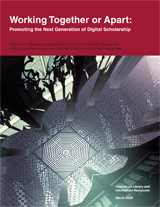A one-day symposium co-sponsored by CLIR and the National Endowment for the Humanities
September 15, 2008
Washington, DC
Description
Advanced research takes place in an evolving, technologically-mediated environment of data, computationally intensive capabilities and functions, and new forms of expression. As part of its ongoing programs in digital scholarship and the cyberinfrastructure to support teaching, learning and research, the Council on Library and Information Resources (CLIR) in cooperation with the National Endowment for the Humanities (NEH) organized a one-day, invitation-only symposium in which we invited a group of some 30 leading scholars to
- articulate the research challenges that will use the new media to advance the analysis and interpretations of text, images and other sources of interest to the humanities and social sciences and in so doing,
- pose interesting problems for ongoing computational research.
We asked each participant to consider the direction of research in the technology (as opposed to capabilities of commercially available applications) as well as the needs and opportunities in several humanities disciplines through a series of background papers, and to consider the following:
- What would I do differently if I only had [x], where “x” represents a desired digital tool, function, or resource?
- What questions would this analysis answer? And why are those questions important?
- What are the implications of the following
-Scale and heterogeneity of source material
-Analytical depth (for example, the ability to see or model a resource or analysis in new ways)
-Power, either locally or remotely (for example, the ability to mobilize more information more quickly)
-Network, viewed as either or both a human or engineered system
Final Performance Report Draft in PDF format >>
Agenda
White papers and final report
Six white papers were commissioned to help us frame the issues. Drafts were originally available on this Web page. They have since been edited and published in a single volume, along with an opening essay by CLIR Director of Programs Amy Friedlander and a summary of a report on digital humanities centers written by Diane Zorich (see chapters listed below). The report Working Together or Apart: Promoting the Next Generation of Digital Scholarship is available at https://www.clir.org/pubs/abstract/pub145abst.html.
Download full report in PDF format (587 KB) >>
Click on each chapter title to download the PDF for that chapter
Participants
Click on a participant’s name to be taken to a brief biographical statement. The asterisk (*) indicates members of the Steering Committee.
Alison Babeu
Tufts University
Anthony Beavers
University of Evansville
Selmer Bringsjord
Rensselaer Polytechnic Institute
Gregory Crane
Tufts University
Robert Darnton
Harvard University Library
Dr. Charles B. Faulhaber
University of California
*Amy Friedlander
Council on Library and Information Resources
David Germano
University of Virginia
*Stephen M. Griffin
National Science Foundation
*Charles Henry
Council on Library and Information Resources
Bernardo Huberman
HP Laboratories
Caroline Levander
Rice University
Marilyn M. Lombardi, Ph.D.
Duke University
*Clifford Lynch
Coalition for Networked Information
Deanna Marcum
Library of Congress
Tara McPherson
USC
David T. Moore
National Security Agency
Stephen Murray
Columbia University
Fraser Neiman
University of Virginia
Stephen G. Nichols
Johns Hopkins University
*Lucile T. Nowell
National Science Foundation
Doug Oard
University of Maryland
Andreas Paepcke
Stanford University
Donna Peuquet
Pennsylvania State University
*Joyce Ray
Institute of Museum and Library Services
Mark Schiefsky
Harvard University
*Kathlin Smith
Council on Library and Information Resources
Matthew W. Stolper
Oriental Institute
Maureen Stone
StoneSoup Consulting
Timothy Tangherlini
UCLA
*Donald J. Waters
The Andrew W. Mellon Foundation
*Joel Wurl
National Endowment for the Humanities


